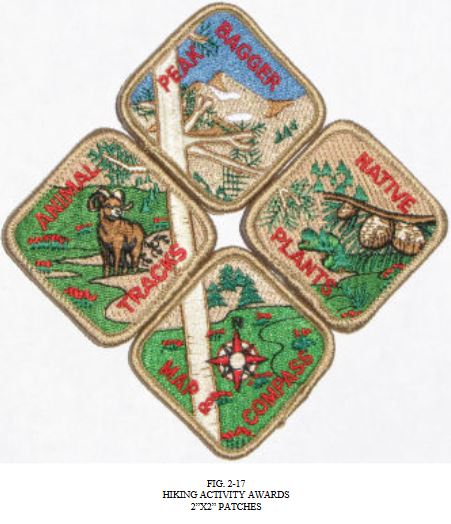|
HIKING ACTIVITY AWARDS
These awards were developed to encourage beginning hiking activities with advancement. They promote hiking and
environmental awareness. The hikes can be
completed within a day or over a weekend. Hikes taken in the city do not qualify
for these awards. These awards are de
signed for Scouts but can be earned by
Scouters who meet the extra requirements
. Each
award is earned on a different hike. E
ach award can be planned so as to
fulfill Second Class requirement 1b.
The tour leader must have planned the hike using an appropr
iate topographic map or maps. The topographic map(s) must be
brought on the hike. As with any Scout activity, a tour permit must be filed with your local BSA Council Office. A
wilderness permit and fire permit must be secured from
the appropriate U.S. Ranger Station when required.
NATIVE PLANTS AWARD
REQUIREMENTS:
1.
Complete a day or weekend hike of at least 5 miles round trip.
2.
Each Scout will begin a plant and tree l
og book for identifying at least 10 local na
tive plants or trees. When completed
the log book must contain an identifying
sketch or picture of each plant and
tree and enough words that will help the
Scout to identify the plants and trees to others. (Note: If a Scout only knows how to identify an oak tree by its acorns
then he would have one of the items for his log book. On th
e other hand, if a Scout knew the difference between a Coast
Live Oak and a Canyon Live Oak, he w
ould have two items for his log book.)
3.
Each Scout will identify at least 4 local
native plants or trees on this hike
and enter them into the log book.
4.
The local native plant and tree log book must be completed within 3 months of the hike. Scouts who have previously
passed First Class requirement 6 must also make their own log book.
5.
Each Scout should know how to identify local poisonous or i
rritating plants such as Pois
on Oak and stinging nettles and
how to treat for exposure to them. (Tenderfoot requirement 11)
Scouter requirements for each award: 1. Complete the requirements fo r the respective award. 2. Be a registered and uniformed leader. 3. Complete Scoutmaster Fundamentals so that you know your role as a leader. 4. You must take enough initiative before each hike to learn the local native plants and trees, wild animals, and map and compass so that you can be a resource to others.
|

|